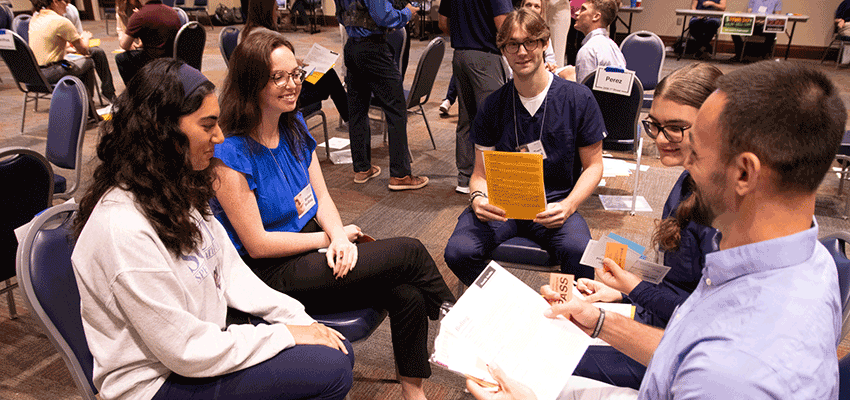Allied Health Hosts Community Action Poverty Simulation
Posted on October 11, 2023 by CAHP

The University of South Alabama Pat Capps Covey College of Allied Health Professions hosted a Community Action Poverty Simulation, an interprofessional education opportunity for students, on Sept. 8.
The Community Action Poverty Simulation is an interactive experience that offers a better understanding of the impact poverty has on many individuals and families. Participants spend an hour role-playing a month in poverty. Every 15 minutes represents a week’s time.
During each session, students learned about the simulation, its mission and how to participate as individuals living in poverty and navigating life’s unexpected challenges with limited resources. Students participated in various simulated roles as children, parents, single individuals and elderly members of the community.
Virginia Murray, a physical therapy student, played the role of a child in a family that struggled to afford food, had limited resources for transportation and eventually had their utilities shut off due to missed payments. Seeing her simulated family struggle day to day, especially when she was out of school for a week and dependent upon their care, provided a new perspective.
“As a family, we experienced frustration, stress and ultimately hopelessness as we realized we had no way to make ends meet during the month,” Murray said.
It was an eye-opening experience for Murray and her peers as they realized how easily healthcare is forgotten due to the everyday needs of individuals, their families and their jobs. They were reminded the importance of maintaining compassion, patience and understanding when working with patients from all socioeconomic backgrounds.
“It is heartbreaking to know people live this way every day, and you can never truly understand what people may be dealing with at home. It is our role as future healthcare professionals to advocate for these people and help them beyond just treating their diagnosis,” Murray shared.
Asia McLeod, an occupational therapy student, entered the poverty simulation not sure what to expect. It was an eye-opening experience that stirred up emotions of sadness and frustration for her because of how those living in poverty were treated during the simulation.
“I was sad for my fellow man who struggles and works hard to succeed in life, but is still looked down on and mistreated simply for needing a little assistance,” McLeod said.
The simulation revealed the obstacles that exist within assistance programs, and McLeod felt that on several occasions, her simulated experiences came with condescending and rude responses from the community workers, interactions that often happen in real life for people living in poverty.
“I learned that as a future healthcare worker, how I treat future patients can and will greatly determine how they take care of their own health. Compassion is key. Being kind to every patient and giving them all the benefit of the doubt, regardless of socioeconomic status is more beneficial than scolding a fellow human being for hard circumstances outside of their control,” McLeod shared.
It is an experience meant to bridge the gap between misconceptions about living in poverty to understanding what it’s like for so many people. Students will have the opportunity to participate in another Community Action Poverty Simulation during the spring semester.
